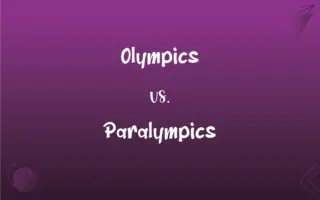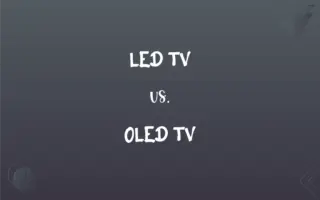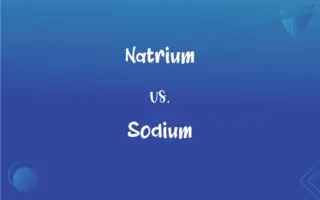Fax vs. Email: What's the Difference?
Edited by Aimie Carlson || By Janet White || Published on January 25, 2024
Fax transmits scanned documents over a phone line, while email sends digital messages and attachments via the internet.

Key Differences
Fax, short for facsimile, involves sending a scanned copy of a document via telephone lines, translating text and images into audio tones. Email, an abbreviation for electronic mail, allows sending and receiving digital messages and attachments over the internet.
Fax machines require physical paper to scan and send documents, often leading to a slower process. Email operates entirely digitally, enabling quick sending of messages and files without the need for printing or scanning.
Faxes are transmitted as images of documents, making them suitable for sending signed documents or hand-written notes. Emails, however, can include typed text, links, and digital files, offering more versatility in communication.
In terms of security, faxes are often considered more secure against hacking, as intercepting a fax requires access to the phone line. Email, while convenient, is more susceptible to cybersecurity threats like phishing and hacking.
Faxing remains relevant in industries like law and healthcare due to its perceived legal authenticity and security. Email has become the predominant form of business communication, offering efficiency, speed, and ease of archiving.
ADVERTISEMENT
Comparison Chart
Transmission Medium
Sent through telephone lines
Sent over the internet
Format
Scanned images of documents
Digital text, links, and attachments
Speed
Slower due to scanning and printing
Instantaneous sending and receiving
Security
More secure against digital hacking
More susceptible to cyber threats
Use in Industry
Preferred for legal documents and in certain industries
Dominant in most business communications
ADVERTISEMENT
Fax and Email Definitions
Fax
It's often used for sending documents that require signatures.
The doctor faxed the prescription to the pharmacy.
It allows sending digital attachments like documents and images.
He attached the report in an email to his supervisor.
Fax
Fax requires a fax machine to scan and send physical documents.
He fed the paper into the fax machine to send the report.
Email is the electronic sending and receiving of messages over the internet.
She received an email confirmation for her online purchase.
Fax
Fax is the transmission of scanned documents via telephone lines.
She sent the signed contract via fax to the lawyer's office.
It's used for both formal and informal digital communication.
The company sent out a newsletter via email to its employees.
Fax
Fax is considered more secure for sensitive documents.
Confidential legal documents were sent via fax for security reasons.
Email enables instant communication globally.
He received an immediate email response from his colleague overseas.
Fax
It involves converting images and text into audio tones for sending.
The office fax machine beeped as it transmitted the document.
Email can be accessed from computers and mobile devices.
She checked her email on her phone during her commute.
Fax
A fax machine.
A system for sending and receiving messages electronically over a computer network.
Fax
A document transmitted or received by a fax machine. In both senses also called facsimile.
A message or messages sent or received by such a system.
Fax
To transmit (a document) by a fax machine.
Fax
The hair of the head.
Fax
Senseid|en|machine}} {{ellipsis of fax machine
Fax
A document sent, or received and printed by a fax machine
Fax
To send a document via a fax machine.
Fax
Alt form of facts.
Fax
Duplicator that transmits the copy by wire or radio
Fax
Send something via a facsimile machine;
Can you fax me the report right away?
FAQs
Is fax still used today?
Yes, especially in legal and healthcare sectors for its perceived security and authenticity.
How secure is email?
Email can be secure but is more vulnerable to cyber threats than fax.
What is an email?
Email is a way to send and receive digital messages and files over the internet.
Can fax be sent to an email?
Yes, through online fax services that convert faxes to email.
Do I need special equipment for email?
No, email can be accessed on any device with internet connectivity.
How fast is fax compared to email?
Email is generally faster, as fax involves scanning and printing.
Can I send pictures via fax?
Yes, but they will be transmitted as black and white scanned images.
Are there storage benefits to email?
Yes, emails can be stored digitally, saving physical space.
Can faxes be intercepted?
It's possible, but intercepting a fax is more challenging than hacking email.
How do I archive emails?
Emails can be archived in digital folders or cloud storage.
What is a fax?
Fax is a method of sending scanned documents over telephone lines.
Can I send a fax from my computer?
Yes, through online fax services that simulate a fax machine.
What's the environmental impact of fax vs. email?
Fax uses paper, while email is more environmentally friendly.
Is faxing suitable for mass communication?
No, fax is better for individual document transmission.
How do spam risks compare between fax and email?
Email is more susceptible to spam and phishing attempts.
Can emails be legally binding like faxes?
Yes, but the legal acceptance varies by region and context.
Is it easier to organize emails?
Yes, email systems offer sorting and organizing features.
Can I access old faxes easily?
Not as easily as emails unless they're digitized and stored electronically.
Do emails have a cost?
Generally, emails are free, except for the cost of internet access.
Is training required to use email or fax?
Basic training is sufficient for both, but email is generally more user-friendly.
About Author
Written by
Janet WhiteJanet White has been an esteemed writer and blogger for Difference Wiki. Holding a Master's degree in Science and Medical Journalism from the prestigious Boston University, she has consistently demonstrated her expertise and passion for her field. When she's not immersed in her work, Janet relishes her time exercising, delving into a good book, and cherishing moments with friends and family.
Edited by
Aimie CarlsonAimie Carlson, holding a master's degree in English literature, is a fervent English language enthusiast. She lends her writing talents to Difference Wiki, a prominent website that specializes in comparisons, offering readers insightful analyses that both captivate and inform.






































































